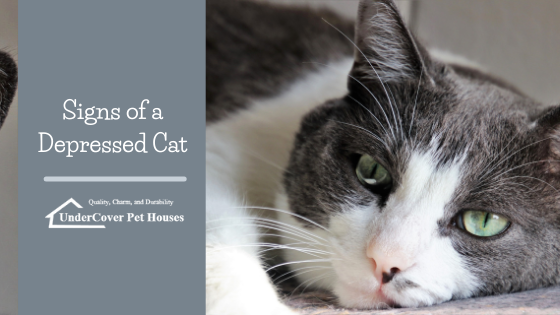 Loading... Please wait...
Loading... Please wait...Blog - sad cat
Is Your Cat Depressed?
Posted by Danny MacDonald on 2021 Jan 27th

Cats are sensitive and emotionally complex creatures. At times, it can be hard to read their mood, which leads us to the question, do cats experience depression? Unknown to many, depression in cats is real and more common than you might think. While it's difficult to diagnose and your cat can easily downplay it, cat depression is a condition that every cat owner should be aware of.
In this article, we tackle cat depression — everything you should know about the condition.
Identifying Depression in Your Cat
Cats can't verbally communicate when suffering. However, they give us clues. Possible depression signs in cats include;
- Increased/ abnormal vocalization
- Aggressiveness /fear
- Reduced/increased appetite
- Weight loss/ gain
- Excessive sleep and lethargy
- Short temper
- Hiding/Withdrawal
- Change in litter box habits
- Behavioral changes
- Decreased /over Grooming
- Loss of interest in activities
Pro Tip: Other than depression, these same symptoms can indicate a health condition, which may require immediate treatment. Should you notice these signs, visit your veterinarian, who will assess the situation and advise you accordingly.
Why Do Cats Get Depressed?
Examples of triggers of depression in cats include:
1. Illness or Injury
Common feline illnesses like diabetes, dental diseases, kidney problems, etc., can cause depression in your cats. Worse yet, if they cause pain. Likewise, injuries that cause discomfort and lameness can leave cats feeling depressed.
2. Environmental Changes
Cats are habitual creatures who dislike uncertainty. Sudden changes such as house moves, home reorganizations can leave your cat stressed as they try to process the events. Eventually, depression can occur if they were attached to the said places and routines.
3. New Pet or Baby
Again, most cats will become angry, uncomfortable, or stressed when a new pet, guests, or even a baby is introduced to the home. To them, it feels like their territory is being threatened or as if they're being replaced or ignored. Have a proper introduction planned for when you bring home a new baby or pet.
4. Loneliness
While cats are perceived as independent creatures, they can develop depression if they're not given enough time and attention. Spare enough time for regular interactions with your cat to avoid clingy and gloomy behaviors. Besides, if you plan on traveling, don't lock up or leave your cat alone in the house. Rather, have someone take care of them.
5. Grief
Cats have been found to mourn both human and animal companions' loss, especially if they shared an emotional bond. Such grief can cause depression in some cats, and they will require some time and care to heal.
How to Help a Depressed Cat
1. Schedule a Vet Visit
If you suspect depression in your cat or observe sudden changes in personality or behavior, taking them to the vet should be your first step. Veterinarians can diagnose your cat and may uncover underlying injuries or illnesses that have been causing a behavioral change in your cat.
Treating such conditions could help treat their behavioral issues and emotional distress in your cat. Vets can also recommend behaviorists, who will help your cat recover from depression.
2. Keep a Regular Routine
As mentioned earlier, cats are habitual creatures. Keeping things in a routine will make your cat feel comforted and help them recover.
3. Provide More Attention
Schedule some quality time and give your kitty undivided attention, so they know how important they are to you. Simple tasks like grooming, exercise, and interactive playing are a great way to help them feel loved and wanted. Moreover, reward your cat every time they portray good behavior.
4. Antidepressant Medication
Sometimes medication is needed to treat depression. Talk to your vet about the most appropriate medication for your cat. Home treatments such as catnip are known to boost a cat's mood and counter depression.
5. Designate Their own Territory
For houses with multiple pets, ensure your cat has a specific space to claim as their territory. This can be in the form of a cat house, high-up perches, etc., where your cat can escape and feel secure.
Wrapping up
Like humans, cats get emotional distress, which can lead to depression. Every cat parent should, therefore, pay close attention to their cat. Should you notice the listed symptoms, talk to your vet immediately for early diagnosis and treatment. Lastly, showering your cat with lots of attention and creating a proper routine for them can go a long way in preventing depression.
